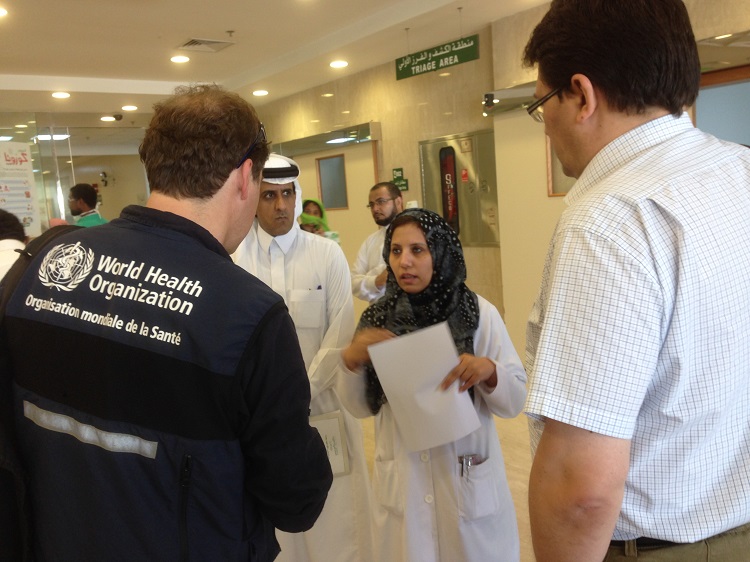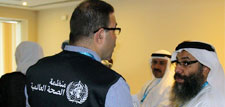 Training workers in health facilities can help to reduce health care-associated outbreaks of MERS-CoV (Photo: WHO).
Training workers in health facilities can help to reduce health care-associated outbreaks of MERS-CoV (Photo: WHO).
Middle East respiratory syndrome (MERS) is an emerging viral respiratory disease caused by the MERS coronavirus, also called MERS-CoV, that was first identified in Saudi Arabia in 2012.
Symptoms of MERS range from none to mild or severe respiratory ailments, including fever, cough, shortness of breath and, on occasion, pneumonia and gastrointestinal symptoms, including diarrhoea. In a handful of patients, particularly those with chronic underlying health conditions, the virus may cause severe illness, leading to respiratory failure that requires mechanical ventilation and support in an intensive care unit. Some laboratory-confirmed cases of MERS-CoV infection are reported as asymptomatic, meaning that they do not have any clinical symptoms, yet they are positive for MERS following a laboratory test. Most of these asymptomatic cases have been detected following aggressive contact tracing of a laboratory-confirmed case.
In the Region, 12 countries (Bahrain, Egypt, Islamic Republic of Iran, Jordan, Kuwait, Lebanon, Oman, Qatar, Saudi Arabia, Tunisia, United Arab Emirates and Yemen) have so far reported laboratory-confirmed cases of MERS. Amongst these countries, imported cases that were associated with travel were reported from Egypt, Lebanon, Tunisia and Yemen.
Current scientific evidence suggests that dromedary camels are a major reservoir host for MERS-CoV and an animal source of MERS infection in humans. However, the exact role of dromedaries in the transmission of the virus and the exact routes of transmission are unknown. Although no sustained human-to-human transmission has been documented, cases have been reported where there was some unprotected contact with infected persons, such as in a health care setting. Health care-associated outbreaks have occurred in several countries, with the largest seen in the Republic of Korea, Saudi Arabia and the United Arab Emirates.
Preventing MERS relies on avoiding unpasteurized or uncooked animal products, practicing safe hygiene habits in health care settings and around dromedaries, community education and awareness training for health workers, as well as implementing effective control measures. There is no specific antiviral treatment recommended for MERS-CoV infection and no vaccine currently available.










